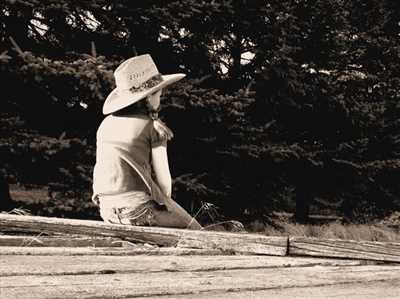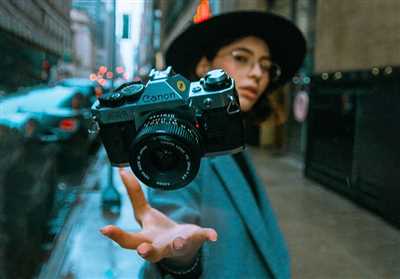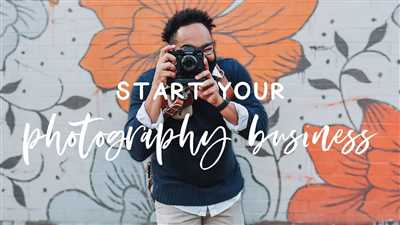
Photography has always been a passion of mine. I have always admired the work of certain photographers, and I was always more satisfied with taking my own pictures than just looking at others. However, it wasn’t until a few years ago that I decided to turn my hobby into something more. This is the story of how I started my journey in the world of photography.
Like most beginners, I started with a basic digital camera. I didn’t have any experience with professional equipment, but I knew that my smartphone photos weren’t giving me the quality and creative control that I desired. So, I decided to invest in a DSLR camera and a variety of lenses to expand my possibilities.
At first, I found it challenging to navigate through all the settings and options available on my new camera. The exposure, white balance, and focus were just a few of the things that I needed to learn to master. But with the help of online tutorials and forums, I quickly familiarized myself with the basics.
As I started shooting more, I realized that there was something missing in my photos. They lacked the wow factor that I saw in the work of experienced photographers. That’s when I discovered the power of post-processing and editing. I started using software like Adobe Photoshop to make changes and improvements to my images.
With each project I undertook, I learned something new. From mastering the manual settings on my camera to finding the right composition, every shoot was an opportunity to improve and grow as a photographer. I also had to develop my own style and brand, something that would set me apart from the rest.
Photography is not just about taking pictures. It’s also about managing your business. Marketing, accounting, and website development are just a few of the additional skills I had to acquire to succeed. I also had to invest in insurance and other services to protect my work and manage my digital assets.
Despite the challenges and hard work, the rewards are immense. Today, I feel confident in my abilities as a photographer. I have developed my own unique style and specialize in creative and high-quality photography. I no longer simply admire the work of others in magazines and videos – now, it’s my work that others admire.
So, if you have a certain passion for photography and are willing to put in the time and effort, I encourage you to take the leap and start your own photography journey. There are countless resources available to help you learn, grow, and succeed in this fascinating art form.
- Getting Started in Photography – 17 Things to Consider
- 1 Invest Time in Photography
- 2 Don’t Rush to Specialise
- 3 Join a Photography Community for Support
- 4 Find a Photography Mentor
- 5 Learn to See Things Differently
- 6 Don’t Worry About Equipment Too Much
- 7 Learn How Your Camera Operates
- Photography Project Ideas for Beginners
- Master the Art of Editing
- 17 Strengthen Your Patience
- How to start a photography business
- Basic business requirements
- Equipment
- Digital services and software
- Videos:
- How I started my PHOTOGRAPHY BUSINESS as a TEENAGER
Getting Started in Photography – 17 Things to Consider
When you begin your journey into photography, there are many things to consider. From learning the basics of exposure to mastering the art of composition, there is a lot to explore in this creative field. Here are 17 things you should keep in mind before you start snapping pictures.
1. Invest in a good camera: One of the most significant decisions you will make is choosing the right camera. Research different brands and models, such as DSLR or mirrorless cameras, to find the one that suits your needs.
2. Learn the manual: Understanding your camera’s manual is essential for capturing great shots. Take the time to study and practice with the various settings and functions so that you can fully utilize the tools at your disposal.
3. Start with the basics: As a beginner, it’s crucial to focus on the fundamentals of photography. Learn about exposure, composition, and lighting, as these are the building blocks of any great photograph.
4. Develop your style: Every photographer has a unique style and point of view. Experiment with different techniques, subject matters, and genres to discover your own voice in the art of photography.
5. Shoot in manual mode: While automatic modes are convenient, shooting in manual mode gives you more control over the final image. Take the time to understand aperture, shutter speed, and ISO to achieve your desired results.
6. Always carry your camera: Opportunities for great photographs can arise at any moment. Keep your camera with you as often as possible to capture those spontaneous and unexpected moments.
7. Practice, practice, practice: Like any skill, photography requires persistence and practice. Keep taking pictures, even if they don’t turn out as you expect. Each shot is an opportunity to learn and improve.
8. Study other photographers’ work: Look at the work of established photographers to get inspired and learn from their techniques. Visit galleries, browse photography books, and explore websites dedicated to showcasing great photographs.
9. Use post-processing tools: Once you’ve captured your images, post-processing tools like Snapseed or Photoshop can help enhance them further. Experiment with these tools to add your personal touch to your photographs.
10. Take risks and be open to changes: Don’t be afraid to try new things and take risks with your photography. Keep an open mind and be willing to embrace changes and challenges as they arise.
11. Build your brand: As you progress in photography, consider creating a brand for yourself. Develop a website or portfolio to showcase your best work and attract potential clients.
12. Learn about copyright and insurance: Understanding copyrights and having photography insurance is essential. Protect your work from unauthorized use and ensure that you have the necessary coverage in case of any accidents or damage to your equipment.
13. Network with other photographers: Connect with other photographers and join photography communities to share your work, get feedback, and learn from others. Networking can lead to valuable opportunities and collaborations in the future.
14. Never stop learning: Photography is a never-ending learning process. Stay curious, explore new techniques, and continuously seek to improve your skills and knowledge.
15. Capture a variety of subjects: Don’t limit yourself to photographing only one subject or genre. Experiment with different subjects and styles to broaden your horizons and discover new interests.
16. Practice patience: Photography requires patience, whether it’s waiting for the perfect lighting or for your subject to be in the right position. Learn to embrace the element of time in your art.
17. Enjoy the journey: Photography should be enjoyable and fulfilling. Take the time to admire your own progress, celebrate your successes, and remember why you fell in love with this art form in the first place.
1 Invest Time in Photography

Photography might seem like a simple task of just photographing and taking pictures, however, it requires time, patience, and open-mindedness to truly become experienced in this art form. To build the perfect image, you should invest time in learning the settings of your camera and how to use other tools such as lenses, filters, and software. It’s important to review galleries and look at the work of multiple photographers to see different tones, styles, and techniques that can be utilized to capture something special.
Investing time in photography also means learning from others, whether it’s through mentorship, online tutorials, or photography courses. There are thousands of free learning resources available such as photography courses on websites like www.photographycourse.net. These courses can give you a better understanding of how digital cameras operate, including mirrorless cameras, and allow you to master the art of photography.
Furthermore, investing time in photography means practicing and capturing images in different environments. You can use apps like Snapseed or Software like Adobe Lightroom for editing and processing your images. This will help you develop your own style and preferences, and make it easier to meet the requirements of your clients or showcase your work in galleries.
In photography, persistence is key. It might be difficult at first, but once you start seeing the proof of your improvement, it becomes even more exciting. Remember that every photograph you take is a learning opportunity, so don’t be afraid to experiment and try new things. Invest your time in photography and see the amazing results it can bring!
2 Don’t Rush to Specialise
When I first started my photography journey, I was so excited to become a photographer that I wanted to specialize in weddings right away. However, I soon realized that there’s so much more to photography than just weddings.
Photography is an art form that allows you to express yourself and capture moments that words cannot describe. It’s a way to transform the ordinary into something extraordinary. So, instead of rushing to specialize, take the time to explore different genres and styles of photography.
By trying out different types of photography, you’ll not only find your preferred niche but also expand your skills and knowledge. You might discover that you enjoy capturing landscapes, portraits, or street photography more than weddings. Don’t be afraid to step out of your comfort zone and try something new.
There are numerous photography galleries and websites where you can learn from experienced photographers. Take advantage of online tutorials and courses that teach you about composition, lighting, and exposure. Explore different editing programs like Adobe Photoshop and Snapseed, which can help you enhance your images and add artistic effects.
Don’t limit yourself to just one camera or lens. Experiment with different equipment and techniques to find your style. Many beginners make the mistake of thinking that they need to invest in expensive gear right from the start. While having high-quality equipment is important, it’s more important to understand how to use your camera effectively.
Patience is key when it comes to photography. It takes time to develop your skills and create stunning photos. Don’t expect to become a professional photographer overnight. It’s a continuous learning process that requires dedication and practice.
As you embark on your photography journey, keep in mind that the market is constantly changing. Clients have different preferences and demands, so it’s crucial to stay adaptable and flexible. Offer a range of services, including content creation and image retouching. Consider offering subscriptions or packages that cater to different customer needs.
It’s also important to keep an eye on the trends in photography and marketing. Stay active on social media platforms and showcase your work to generate interest. Create a website or blog to establish an online presence and attract potential clients. Don’t forget to take care of the business side of photography as well, such as getting insurance and keeping track of your finances.
Remember, photography is a journey, and every step you take will teach you something new. Don’t be too quick to specialize. Enjoy the process of exploring different genres, experimenting with various techniques, and creating unique and exceptional photographs.
3 Join a Photography Community for Support
When I started my photography journey, I quickly realized that there is so much to learn in the world of digital photography. The cameras and software available today are capable of producing amazing images, but knowing how to use them effectively takes time and practice.
One of the best decisions I made early on was to join a photography community. These communities are usually found online, where photographers of all levels come together to share their work, ideas, and experiences. There is a wide variety of websites, forums, and social media groups dedicated to photography.
Being a part of a photography community has been a game-changer for me. I can see the work that other photographers are producing, get inspired by their ideas, and also get feedback and support for my own work. It’s a great way to learn and grow as a photographer.
Within these communities, there are often enthusiastic photographers who are willing to mentor and guide beginners. They can help you navigate the world of photography, teach you new techniques, and provide valuable feedback on your work. Having a mentor can greatly accelerate your learning process and help you improve much faster.
In addition to feedback and mentorship, photography communities are also a great place to find resources and solutions for any challenges you may face. Whether you need help with camera settings, post-processing software, or even accounting for your photography business, there is usually someone within the community who can assist you.
Another benefit of joining a photography community is being aware of upcoming events, workshops, and exhibitions. These communities are a great source of information for local photography meetups, gallery showings, and professional workshops. By attending these events, you can not only expand your knowledge and skills but also meet other like-minded individuals and establish valuable connections.
As a part of the photography community, you’ll also get exposed to a variety of photographic styles and genres. This exposure will push you to explore different ideas and challenge your own boundaries. You’ll get to see how other photographers approach subjects like weddings, nature, street photography, and more. This exposure helps you develop your own unique style and vision.
To keep up with the latest trends in the industry, it’s important to stay connected within the photography community. Many community members share valuable articles, videos, and tutorials that will keep you informed and inspired. You’ll learn about new cameras, editing techniques, and even get tips on managing your photography business.
In summary, joining a photography community has been one of the best decisions I made when I started my photography journey. The support, feedback, and resources I’ve gained from being a part of these communities have been invaluable. Whether you’re a beginner or an experienced photographer, there is always something to learn and gain from being a part of a photography community.
4 Find a Photography Mentor
Finding a photography mentor can have a significant impact on your journey as a photographer. They can provide guidance, share their experiences, and help you improve your skills. Here are some requirements to consider when searching for a mentor:
- Quality of their work: Look for a mentor who has a gallery or portfolio that showcases high-quality images.
- Experience in photographing subjects you’re interested in: If you specialize in certain types of photography, like weddings or landscapes, find a mentor who has experience in those areas.
- Willingness to teach: Your mentor should be enthusiastic about sharing their knowledge and helping you grow as a photographer.
- Compatibility: It’s important to find a mentor whose teaching style and personality align with yours.
Once you find a mentor, there are many ways they can help you improve:
- Review your work: A mentor can provide valuable feedback and help you identify areas for improvement.
- Teach you new techniques: They might show you how to use different camera settings, lens choices, or editing tools.
- Guide you in developing your own style: A mentor can help you find your unique voice and create a signature look in your photographs.
- Introduce you to the business side of photography: They can teach you about pricing, marketing, and finding clients.
- Offer solutions to challenges: Photography can be challenging at times, and a mentor can provide guidance on how to overcome obstacles.
Remember, finding a mentor is not about cloning their work. Instead, it’s about learning from their expertise and incorporating their wisdom into your own style. Be patient and keep practicing, as acquiring the skills to capture compelling images takes time.
There’s also another way to learn from experienced photographers – attending workshops or events where professionals share their knowledge. These events are a great opportunity to network and learn from others in the industry.
Lastly, don’t forget to review their online presence. Many photographers have websites or social media profiles where they showcase their work and share tutorials or behind-the-scenes videos. This can provide you with valuable insights and inspiration.
In conclusion, finding a photography mentor can be a game-changer for your skills and career. Seek someone who meets your requirements and is willing to guide you on your photographic journey. By learning from their experiences and incorporating their wisdom, you can become a better photographer and master the art of capturing the most beautiful moments.
5 Learn to See Things Differently
One of the most important skills to develop as a beginner in photography is learning to see things differently. The world is full of subjects and tones waiting to be captured, but it’s up to you to learn how to transform them into the perfect shot. You’ll need to overcome the challenges of seeing things from a new perspective and training your eye to notice the smallest details in your surroundings.
Acquiring the skill of seeing things differently doesn’t have to cost you a fortune. There are many free online tools and resources that can help you in this journey. Photography courses, subscriptions to photography magazines, and online galleries are just a few examples that can give you inspiration and help you develop your own style.
Here are 4 tips on how you should approach your photography journey:
1. Stop and Look Around: Photography is a journey of capturing the world around you, so don’t rush through it. Take the time to observe the world and find interesting subjects that catch your eye.
2. Experiment with Composition: Don’t feel limited by what’s in your field of vision. Instead, try different angles, perspectives, and compositions to create unique and visually appealing images. Don’t be afraid to break traditional rules of composition if it helps you convey your vision.
3. Invest in Patience: Photography is not about snapping a perfect shot in an instant. It’s about waiting for the right moment, the perfect lighting, or the ideal subject. Patience is key to capturing those magical moments.
4. Develop Your Style: While it’s important to learn from others and get inspiration, don’t try to replicate someone else’s style. Use the knowledge and techniques you acquire to develop your own unique style and vision.
Remember, photography is a journey, and it’s a journey that will challenge you. There’s a variety of techniques and subjects to explore, and your goal should be to continuously improve and challenge yourself to see things differently. Don’t be too hard on yourself and have fun along the way!
6 Don’t Worry About Equipment Too Much
When starting out in photography, it’s easy to get caught up in the excitement of buying new equipment. There are thousands of cameras, lenses, and accessories on the market, each promising to take your photography to the next level. However, it’s important not to get too caught up in the gear and instead focus on mastering the art of photography.
Many beginner photographers mistakenly believe that owning a top-of-the-line camera will instantly make them a better photographer. While having a high-quality camera can certainly help improve the technical aspects of your photos, it’s not the most important factor in creating great images.
Instead of spending all your time and money on the latest equipment, it’s more important to learn and understand the basic principles of photography. Knowing how to manually control exposure settings, like aperture, shutter speed, and ISO, will give you more control over your images and allow you to get the creative effects you desire.
Fortunately, you don’t need expensive equipment to start learning and practicing photography. Many entry-level cameras have all the features and functions necessary to develop your skills. Even a smartphone can be a great tool for learning the basics of composition, lighting, and capturing great moments.
Additionally, there are plenty of free or affordable software programs available that can help you edit and enhance your photos. Programs like Adobe Photoshop and Lightroom offer a wide range of editing tools and filters to help you achieve the look and style you desire.
Before rushing out to buy the latest camera or lens, take the time to really get to know the equipment you already have. Experiment with different settings and techniques to understand what they do and how they can be used creatively. This will not only save you money but also help you become more comfortable with your gear.
Remember, it’s the photographer, not the equipment, that creates stunning images. So don’t let gear envy or the pressure to always have the latest and greatest equipment hold you back. Focus on developing your artistic eye, mastering the technical aspects, and capturing the moments that inspire you.
One final tip: It’s also a good idea to invest in insurance for your equipment, especially if you plan to shoot events like weddings or open a gallery to display your work. This will protect you financially in case of theft, damage, or loss of your gear.
7 Learn How Your Camera Operates
Learning how your camera operates is one of the most important aspects of photography. Whether you’re shooting with a digital or film camera, understanding its functions and settings will enable you to take better pictures.
For beginners, it can be overwhelming to see all the buttons, dials, and menus on a camera. But don’t worry, with time and persistence, you’ll get the hang of it. Start by familiarizing yourself with the basics – how to turn it on, how to adjust the focus, how to change the ISO, and how to set the exposure. These are all significant settings that will greatly influence the outcome of your photos.
If you’re shooting with a film camera, you may also need to learn how to load the film and rewind it once you’re done. On the other hand, if you’re using a digital camera, it’s essential to learn how to manage the memory card, as well as how to connect it to a computer to transfer your photos.
Fortunately, there are many resources available online to teach you the ins and outs of your specific camera model. You can find tutorials, user manuals, and even online courses to help you fully understand how everything works.
Developing a good understanding of your camera is especially important for photographers who want to turn their passion into a business. Knowing how to operate your camera efficiently will save you time on shoots and allow you to capture the shots you envision.
Moreover, being able to demonstrate a high level of technical expertise will help build your brand as a professional. Clients and customers like to see that you know what you’re doing and that you can deliver high-quality work.
So take the time to learn how your camera operates. Experiment with different settings, play with the exposure, and find the colours and compositions you like. Over time, you’ll develop your own style and preferences that will set your work apart from others.
Remember, photography is a creative art, and your camera is the tool you use to generate the pictures. Like any craft, it requires practice, persistence, and patience to master. So don’t rush the process – take your time to learn and enjoy every step of the way.
There are also many apps and software solutions available that can help you enhance and edit your photos. Snapseed is a popular choice among both beginners and experienced photographers. It offers a range of tools and filters to make your photos look even better.
While it’s important to learn how to use editing apps to improve your photos, it’s equally important not to rely on them as a crutch. Developing your photography skills should be your primary goal, and editing should be used as a supplementary tool to enhance your images.
So, don’t get discouraged if your photos don’t turn out as you expected in the beginning. Keep practicing and learning from your mistakes. Photography is a journey, and every step you take is a chance to grow and improve.
Photography Project Ideas for Beginners
When I started photography, I found that having specific projects to work on helped me develop my skills and creativity. If you’re a beginner looking for some project ideas, here are a few to get you started:
1. Explore Filters: Experiment with different filters to see how they can enhance your photos. Filters can be used to adjust the tone, color, or mood of your images.
2. Create a Photo Series: Choose a theme or subject and capture a series of photos that tell a story or convey a specific emotion. This will help you develop your storytelling skills.
3. Learn Long Exposure: Try your hand at long exposure photography, which involves using a slow shutter speed to capture motion. This technique can create stunning effects with moving subjects.
4. Master Portrait Photography: Practice taking portraits of friends, family, or even clients. Focus on capturing their personality and creating a connection with your subject.
5. Document Events: Attend local events or gatherings and document them with your camera. This can be a great way to practice capturing candid moments and telling the story of the event.
6. Experiment with Light: Play with different lighting conditions and learn how it can transform your photos. Try shooting during golden hour, blue hour, or even at night to see how lighting can create different moods.
7. Try Different Camera Angles: Don’t be afraid to get creative with your camera angles. Get low to the ground, shoot from above, or experiment with shooting through objects to add interest to your compositions.
Remember, the key to improving your photography skills is practice and persistence. Keep learning, experimenting, and pushing yourself to try new things. And don’t be afraid to seek feedback and review your work – constructive criticism can help you grow as a photographer.
If you’re looking for online resources and tools to support your photography journey, there are plenty of apps, websites, and communities available. Online photography courses, such as , can help you learn the basics and advanced techniques. Editing software like Adobe Photoshop or mobile apps like Snapseed can assist in processing your images. And joining photography communities or forums can provide you with a supportive network of enthusiastic photographers.
So don’t be overwhelmed by the vast world of photography. Start with these project ideas, learn from reliable sources, and practice as much as you can. With time and dedication, you’ll develop your own unique style and build a portfolio that represents your artistic vision.
Master the Art of Editing

Once you have captured the perfect shot with your camera, the next step is to master the art of editing. Editing is where you can truly bring your vision to life and create stunning images.
There are many editing tools available, but it’s important to not get bogged down with using every tool. Instead, focus on mastering a few basic tools that will likely have a more significant impact on your photographs.
One of the most important things to consider is the tone and colours of your image. You’ll want to familiarize yourself with the different filters and editing options available in programs like Photoshop or Snapseed. These tools can help you adjust the brightness, contrast, and overall look of your image.
It’s also important to remember that editing should not be used to fix mistakes made while photographing. Instead, think of it as a way to enhance the image and bring out its full artistic potential.
When editing, it’s easy to get carried away and make significant changes to your photo. However, it’s essential to avoid going overboard and ending up with an image that looks unrealistic or artificial. A good rule of thumb is to make changes that enhance the image without fundamentally changing its subject matter.
As a beginner, it can be tempting to rush through the editing process and publish your photos online right away. However, taking the time to review and fine-tune your edits will ultimately result in stronger images. Quality is more important than quantity.
If you’re serious about photography and want to take your editing skills to the next level, consider joining photography subscriptions or online courses that offer more in-depth lessons on editing techniques.
Furthermore, building a portfolio and establishing your own photography company may also require meeting certain editing requirements. Clients are likely to expect high-quality, well-edited images, so it’s important to have a thorough understanding of editing techniques.
While editing tools and techniques are essential, it’s important to remember that they are not a substitute for having good photography skills. It’s crucial to invest time in understanding your camera, its settings, and various lenses. Moreover, learning to shoot in manual mode and experimenting with different subjects will help you generate better raw images that can be later enhanced during the editing process.
In conclusion, mastering the art of editing is a necessary skill for any photographer. It allows you to add your own personal touch to your images and bring them to life. With the right tools and knowledge, you’ll be able to create stunning photographs that people will admire.
17 Strengthen Your Patience
Patience is a key quality that every photographer must possess. It is something that I had to learn along my journey of starting my photography business. At first, I was eager to capture the perfect shot and get credited for my work. But photography taught me that it’s not always about the end result.
Once I got my hands on my first camera, a basic digital one, I quickly realized that it was not as easy as it seemed. I had to learn how to operate the camera, understand exposure settings, and manage tones. This required a lot of patience and persistence.
During my early days, I often found myself getting frustrated with the results of my photographs. They didn’t look as good as the ones I admired online or in magazines. But instead of giving up, I decided to use these experiences as motivation to improve.
One significant change that helped me was investing in better equipment. I upgraded to a mirrorless camera and invested in a variety of lenses and filters. This allowed me to have more control over my images and achieve the look I desired.
I also started to consider the importance of post-processing. Editing software like Snapseed became my go-to tool to enhance the details in my photos and make them more visually appealing. I learned how to use different techniques, such as adjusting exposure and applying filters, to create a unique style.
Another aspect that required patience was managing my photography business. Building a brand, finding clients, and completing projects all took time. I had to be patient and persistent to grow my business and establish my reputation.
Weddings were one type of photography project that tested my patience the most. There’s so much going on, and you have to be ready to capture every special moment. It can be challenging, but it’s also incredibly rewarding when you see the final gallery and realize that you were able to freeze those precious memories.
But it’s not just about patience during the actual photography process – patience is essential during the healing process as well. Sometimes, clients may not be satisfied with the initial results, and I had to be patient and work with them to find a solution that they were happy with.
The most important lesson I learned about patience is that it’s not just about waiting. It’s about embracing every step of the journey and recognizing that every experience, whether positive or negative, is an opportunity to learn and grow as a photographer.
So, if you’re just starting your photography journey or are an experienced photographer, remember to strengthen your patience. It will help you stay motivated, manage your projects, and ultimately take better photographs.
How to start a photography business
Starting a photography business can be an exciting and fulfilling venture for those who love capturing moments through the lens. However, it requires careful planning and strategic thinking to ensure its success. Here are some tips on how to get started:
| Invest in the right tools | Shoot in your preferred style |
| To take high-quality photographs, it’s important to invest in good cameras, lenses, and other tools that will help you capture the perfect shot. Do thorough research and read reviews to choose the best equipment that suits your needs. | Developing a unique photography style will make your work more recognizable and give you an edge over competitors. Experiment with different techniques, explore different genres, and find the style that best represents you as an artist. |
| Build a strong brand | Find a mentor |
| Having a strong brand is crucial for any business. Design a logo, create a cohesive visual identity, and develop a compelling brand story that resonates with your target audience. This will help you attract customers and stand out in the market. | Having a mentor who is experienced in the photography business can provide valuable guidance and support. Look for someone who can offer advice, share their knowledge, and help you overcome challenges that may arise along the way. |
| Open a business bank account | Get insurance |
| Separating your personal and business finances is essential for financial management. Open a business bank account to keep track of your income and expenses and make tax filing easier. | Having insurance coverage is important to protect yourself and your equipment in case of accidents, damage, or theft. Consult with insurance providers to find the right coverage for your specific needs. |
| Market your business | Stay creative and improve |
| Implement a marketing strategy to promote your services and reach potential customers. Utilize social media platforms, build a website showcasing your portfolio and services, and engage in networking events or collaborations to expand your client base. | Never stop learning and seeking ways to improve your photography skills. Attend workshops, take online courses, join photography communities, and regularly review your work to identify areas that need refinement. |
| Have a detailed pricing and contract structure | Be customer-oriented |
| Create a pricing structure that reflects the value of your work and the time and effort you put into each project. Clearly outline your rates and terms in contracts to avoid misunderstandings with clients. | Providing exceptional customer service and ensuring client satisfaction should be a priority. Listen to your clients’ needs and preferences, communicate effectively, and deliver the results they desire. Happy customers will help you build a strong reputation and bring in new business through word-of-mouth referrals. |
Starting a photography business may seem daunting at first, but with the right tools, mindset, and persistence, it can be a rewarding and fulfilling journey. Remember to stay focused on your goals, be open to change, and always strive for improvement. Good luck on your photography business venture!
Basic business requirements
Starting a photography business requires more than just a camera and a passion for taking pictures. There are several basic business requirements that you need to keep in mind in order to establish yourself as a professional photographer. Whether you like it or not, photography is not just an art form but also a business, and you need to treat it as such.
First and foremost, you need to establish yourself within the photography community. Joining photography courses, attending events, and joining photography clubs or communities can help you find clients, acquire new skills, and stay up to date with the latest trends and techniques. It’s also a great way to network with other photographers and potentially find a mentor who can guide you on your photography journey.
Accounting and financial management are also important aspects of running a photography business. You need to keep track of your income and expenses, manage your finances, and establish a bank account for your business. This requires persistence and some basic knowledge of accounting principles.
When it comes to your photography services, you should have a clear selection of offerings and establish the prices for each. This may include event photography, portrait sessions, or even providing photography services for businesses. You should also be familiar with image processing tools and techniques to ensure that your photographs are of high quality and meet the needs of your clients.
Getting the right equipment is also crucial. While it doesn’t mean that you have to invest in the most expensive cameras and lenses right from the start, you need to have a reliable camera that can capture sharp images with good tonal ranges. Understanding the basic technical aspects of cameras and mastering their settings will help you achieve the desired effect in your photographs.
Open yourself to learning and acquiring new skills. Photography is an ever-evolving art form, and there are always new techniques and tools to familiarize yourself with. Keep challenging yourself to take more creative and innovative pictures, and don’t be afraid to experiment with different subjects and styles. This will help you stand out from the competition and transform your photography business into a unique and highly sought-after service.
Managing multiple clients and projects can be difficult, especially for an experienced photographer. However, it is a skill that you need to master in order to run a successful photography business. This includes proper time management, efficient communication with clients, and delivering the final product within the agreed-upon timeframe.
Establishing a strong online presence is essential in today’s digital world. Create a professional website and showcase your best photographs and services. Use social media platforms to promote your work and engage with potential clients. Invest in good quality prints and create a portfolio that highlights your expertise and style.
Lastly, never underestimate the power of enthusiasm and persistence. Starting a photography business can be challenging, but with the right mindset and determination, you can overcome any obstacles that come your way. Remember, success doesn’t come overnight, but with hard work, dedication, and a genuine love for the art of photography, you can turn your passion into a thriving business.
Equipment
When I first started my photography journey, I was using a basic point-and-shoot camera. While it was a good starting point, I soon realized that if I wanted to take my photography to the next level, I would need to invest in some better equipment.
After doing some research and talking to other photographers, I decided to upgrade to a DSLR camera. This type of camera offers more control over settings and allows for interchangeable lenses, which is essential for capturing different types of scenes and subjects.
In addition to a DSLR camera, there are a few other pieces of equipment that I believe every photographer should have:
- A versatile lens: Having a lens that can capture a wide range of focal lengths will allow you to shoot a variety of subjects, from landscapes to portraits.
- A sturdy tripod: This is especially important for landscape photography and long exposure shots. It helps to keep your camera steady and eliminates blur caused by shaky hands.
- A good quality memory card: You don’t want to miss out on capturing important moments because your memory card is full or unreliable. Invest in a high-capacity and reliable memory card.
- A few filters: Filters can help you enhance your photos by controlling light, reducing reflections, and adding special effects like polarizing or graduated filters.
- Editing software: While it’s important to get the shot right in-camera, post-processing can significantly enhance your images. There are many software solutions available depending on your preferences and budget.
It’s worth mentioning that equipment alone doesn’t make a photographer. It’s the vision, skill, and creativity that are key. While having good gear can make things easier, it’s the photographer’s eye and ability to capture moments that truly matter.
Throughout my photography journey, I’ve found that the most important equipment is not always the most expensive or the newest. It’s the equipment that helps me express my vision and capture the world the way I see it.
So, don’t get caught up in the gear race. Focus on building your skills, experimenting with different techniques, and finding your own unique style. The right equipment will come with time and experience.
Digital services and software
When starting out in photography, there are several digital services and software that you should be aware of. These tools can significantly enhance your photography experience and help you capture better quality images. Here are some key things you should know about:
- Long exposure: If you’re interested in capturing breathtaking shots of weddings or any other event, learning how to do long exposure photography is a must. This technique allows you to capture the movement of objects over a longer period of time, resulting in stunning visual effects.
- Detailed editing: Investing in a good editing software is crucial for any photographer. You might find Adobe Lightroom or Photoshop to be suitable options, but there are also free alternatives like Snapseed that provide a variety of editing tools.
- Mentor: Finding a mentor who can guide you through your photography journey is a great way to accelerate your learning process. They can give you valuable tips and ideas, and help you overcome any challenges you might face.
- Insurance: As a beginner, it’s essential to obtain insurance for your photography equipment. Accidents can happen, and having insurance can give you peace of mind in case something goes wrong.
- Digital galleries: Showcasing your work in online galleries can help you gain exposure and attract potential clients. There are many platforms available where you can create your own portfolio and share your artwork with the world.
- Mirrorless cameras: Mirrorless cameras have been gaining popularity in recent years due to their compact size and advanced features. They offer a great alternative to traditional DSLR cameras and can be a fantastic tool for both beginners and professionals.
- Basic settings: Understanding the basic settings of your camera is crucial. Take the time to experiment with different settings and learn how each one can affect the outcome of your photos.
- Digital effects: Digital effects can transform your photos and give them a unique touch. Experiment with different effects and find your own style to make your photos stand out.
- Customer experience: Providing a great customer experience is key to building a successful photography business. Always aim to deliver high-quality work and pay attention to the needs and preferences of your clients.
By utilizing these digital services and software, you can enhance your photography skills and take your art to a whole new level. Don’t worry if it takes time to master these tools – with practice, patience, and enthusiasm, you’ll eventually become a confident and skilled photographer.








